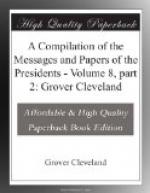The first article further confers the power upon this Government to regulate, limit, or suspend, but not actually to prohibit, the coming of such laborers to or their residence in the United States. The negotiators of the treaty have recorded with unusual fullness their understanding of the sense and meaning with which these words were used.
As to the class of persons to be affected by the treaty, the Americans inserted in their draft a provision that the words “Chinese laborers” signify all immigration other than that for “teaching, trade, travel, study, and curiosity.” The Chinese objected to this that it operated to include artisans in the class of laborers whose immigration might be forbidden. The Americans replied that they “could” not consent that artisans shall be excluded from the class of Chinese laborers, for it is this very competition of skilled labor in the cities where the Chinese labor immigration concentrates which has caused the embarrassment and popular discontent. In the subsequent negotiations this definition dropped out, and does not appear in the treaty. Article II of the treaty confers the rights, privileges, immunities, and exemptions which are accorded to citizens and subjects of the most favored nation upon Chinese subjects proceeding to the United States as teachers, students, merchants, or from curiosity. The American commissioners report that the Chinese Government claimed that in this article they did by exclusion provide that nobody should be entitled to claim the benefit of the general provisions of the Burlingame treaty but those who might go to the United States in those capacities or for those purposes. I accept this as the definition of the word “laborers” as used in the treaty.
As to the power of legislating respecting this class of persons, the new treaty provides that we “may not absolutely prohibit” their coming or their residence. The Chinese commissioners gave notice in the outset that they would never agree to a prohibition of voluntary emigration. Notwithstanding this the United States commissioners submitted a draft, in which it was provided that the United States might “regulate, limit, suspend, or prohibit” it. The Chinese refused to accept this. The Americans replied that they were “willing to consult the wishes of the Chinese Government in preserving the principle of free intercourse between the people of the two countries, as established by existing treaties, provided that the right of the United States Government to use its discretion in guarding against any possible evils of immigration of Chinese laborers is distinctly recognized. Therefore if such concession removes all difficulty on the part of the Chinese commissioners (but only in that case) the United States commissioners will agree to remove the word ‘prohibit’ from their article and to use the words ’regulate, limit, or suspend.’” The Chinese reply to this can only be inferred from the fact that in the place of an agreement, as proposed by our commissioners, that we might prohibit the coming or residence of Chinese laborers, there was inserted in the treaty an agreement that we might not do it.




